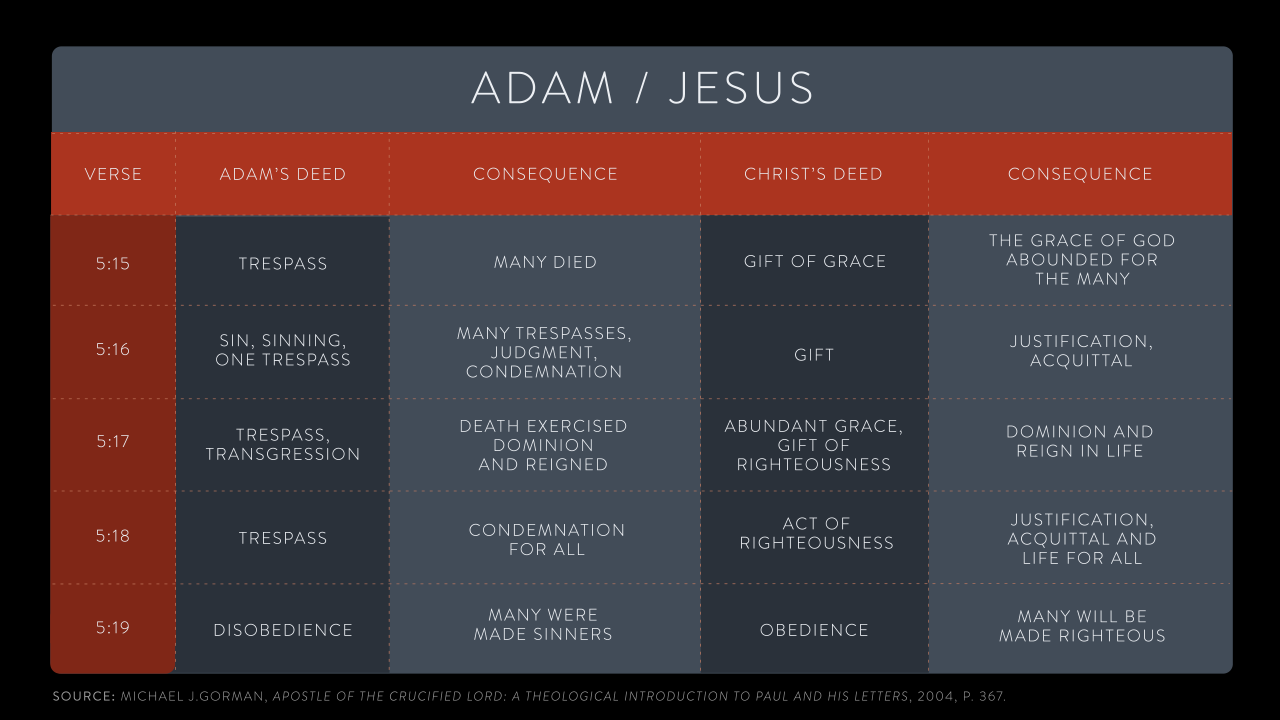Journey Through RomansНамуна

Intro
Nicole introduces this course on Romans as an occasional letter with universal appeal.
Intro
Nicole next introduces this lesson on Romans as a theological treatise.
Romans as a Theological Treatise: In the Text
Paul’s theology is deeply rooted in the Old Testament. Consider some of the OT parallels Paul uses to explain the work of Christ.
Adam & Christ

One comparison we find in Romans is between Adam and Jesus. Paul presents Jesus as our redeemer from Adam’s fall. In these verses the basic idea is the same, but Paul says it a little bit differently each time. The table above highlights some of the distinctions.
But the free gift is not like the trespass. For if the many died through the one man’s trespass, much more surely have the grace of God and the free gift in the grace of the one man, Jesus Christ, abounded for the many. And the free gift is not like the effect of the one man’s sin. For the judgment following one trespass brought condemnation, but the free gift following many trespasses brings justification. If, because of the one man’s trespass, death exercised dominion through that one, much more surely will those who receive the abundance of grace and the free gift of righteousness exercise dominion in life through the one man, Jesus Christ.
Therefore just as one man’s trespass led to condemnation for all, so one man’s act of righteousness leads to justification and life for all. For just as by the one man’s disobedience the many were made sinners, so by the one man’s obedience the many will be made righteous.
Romans 5:15-19 (NRSV)
Abraham & Christ
In Romans, Abraham is contrasted with Adam. Jesus saves us by reversing Adam’s sin, whereas Abraham is a forerunner of the faithfulness of Jesus.
Paul frames Abraham as a faithful servant of God who inverts some of the failures of humanity outlined in chapter 1. Read the passages below that describe the failures of humanity followed by passages featuring the faithfulness of Abraham:
Ever since the creation of the world his eternal power and divine nature, invisible though they are, have been understood and seen through the things he has made. So they are without excuse; for though they knew God, they did not honor him as God or give thanks to him, but they became futile in their thinking, and their senseless minds were darkened. Claiming to be wise, they became fools; and they exchanged the glory of the immortal God for images resembling a mortal human being or birds or four-footed animals or reptiles.
Therefore God gave them up in the lusts of their hearts to impurity, to the degrading of their bodies among themselves, because they exchanged the truth about God for a lie and worshiped and served the creature rather than the Creator, who is blessed forever! Amen.
For this reason God gave them up to degrading passions. Their women exchanged natural intercourse for unnatural, and in the same way also the men, giving up natural intercourse with women, were consumed with passion for one another. Men committed shameless acts with men and received in their own persons the due penalty for their error.
Romans 1:20-27 (NRSV)
… (as it is written, “I have made you the father of many nations”)—in the presence of the God in whom he believed, who gives life to the dead and calls into existence the things that do not exist. Hoping against hope, he believed that he would become “the father of many nations,” according to what was said, “So numerous shall your descendants be.” He did not weaken in faith when he considered his own body, which was alreadyas good as dead (for he was about a hundred years old), or when he considered the barrenness of Sarah’s womb. No distrust made him waver concerning the promise of God, but he grew strong in his faith as he gave glory to God, being fully convinced that God was able to do what he had promised.
Romans 4:17-21 (NRSV)
Paul uses Abraham as an important touchpoint. Abraham is not just an historical individual for Paul; he’s a type of person. Abraham is the type of faithful person that foreshadows the coming of Jesus in the New Testament. Bible scholar Dr. Dennis Kinlaw says it well: “When God called Abraham, he had Jesus in mind.” Jesus perfects the faithfulness of Abraham at the same time that he fulfills God’s promise to him.
Quote from: Dennis F. Kinlaw, Lectures in Old Testament Theology, 2010, p. 117.
About this Plan

Have you ever wished for a Bible study that could take you beyond surface-level reading? If so, get ready for our journey through the book of Romans! You'll get to immerse yourself in Scripture (by looking at key terms and ideas), explore what's behind it (by learning historical-cultural background), and also discover its impact by considering its implications, not only for you, but for the global church. Let's dive in!
More
Нақшаҳои марбут ба мавзӯъ

Moses: A Journey of Faith and Freedom

Prayer Altars: Embracing the Priestly Call to Prayer

YES!!!

One Chapter a Day: Matthew

Faith-Driven Impact Investor: What the Bible Says

Psalms of Lament

I'm Just a Guy: Who Feels Alone

Deeper in Worship

Spirit-Led Emotions: Mastering Emotions With Holy Spirit
